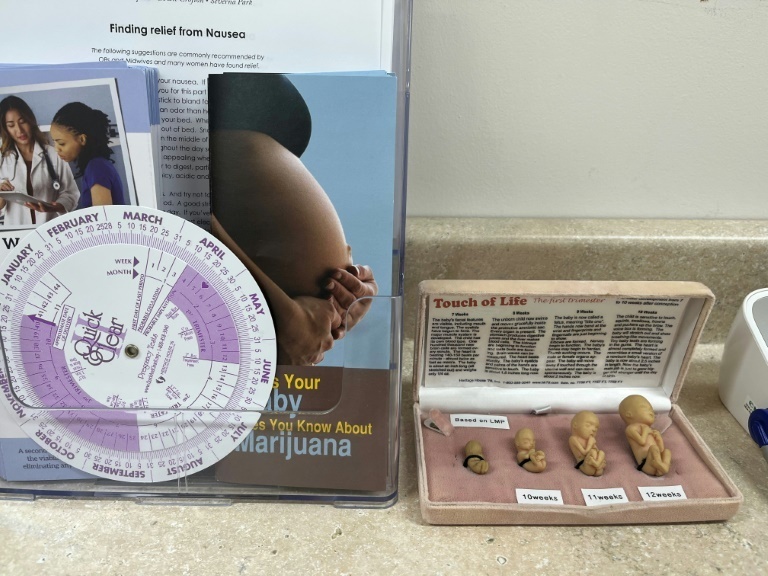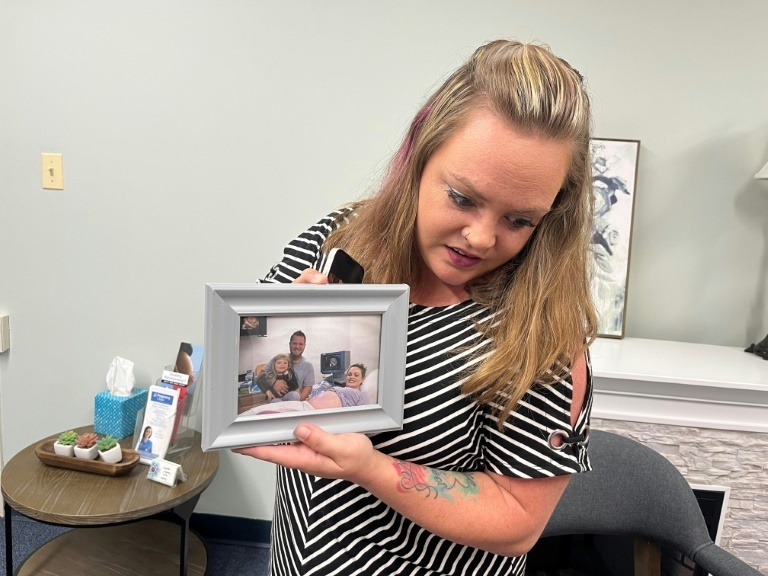Activist Lydia Heykamp goes door-to-door in a quiet Virginia suburb with a pressing message: now that the constitutional right to abortion has been overturned, the state must ban it outright.
The 23-year-old is part of a new offensive in America's anti-abortion movement, as it pivots from the national stage following last year's Supreme Court decision ending the constitutional right to a termination.
"I was ecstatic," Heykamp told AFP. But, she says, "that was just the beginning."
"I don't think I could stay silent and sit on the sidelines."

"The movement is still pretty far away from what it wants, which is a nationwide ban on abortion," said Mary Ziegler, a law professor at the University of California, Davis, who studies reproductive politics.
In a country where the majority believe abortion should be legal in most cases, activists such as Heykamp have refocused their efforts on state legislatures, courts and local communities.
- '100 percent pro-life' -
The complexity of the task can be seen in the conversations between Heykamp, dressed in a red T-shirt marked "Post-Roe generation votes," and affluent residents outside Virginia's state capital Richmond.
She and fellow volunteers advocate for Mark Earley, a candidate running for the Virginia House of Delegates in November, who calls himself "100 percent pro-life," and were targeting homes identified as likely leaning Republican.

"Abortion is an act of violence against human life, another act of violence doesn't fix the act of violence that was committed against the mother," she says.
For Heykamp, one source of her passion is her younger sister who has Down syndrome -- most fetuses diagnosed with the disorder in the United States are aborted.
Most residents of the large houses on manicured lawns who opened their doors agreed with Heykamp on curbing abortion to some extent -- but not necessarily on a blanket ban.
Ken Johnson, 71, a retired cigarette manufacturer, was by and large opposed to abortion.
"If it's just 'got drunk Saturday night and forgot to take the pill,' I'm sorry, you got to think a little bit further ahead," he told AFP, as two small dogs barked inside his house.
But he also saw rape or incest as legitimate reasons to terminate a pregnancy.
"If a law has been broken, sure," Johnson said.
Shirley Miller, a retired school teacher in her late seventies, believes there are times when the well-being of the mother trumps that of the fetus, such as the case of a 10-year-old rape victim from Ohio.
That story caused a national uproar last summer when the girl had to travel out of state to have access to an abortion.
"What 10-year-old child needs to be a mother," Miller told AFP. "I agree with abortion in that case, wholeheartedly."
- Counseling against abortion -

"We will move legislation that we think will pass in one state, but it may not pass in another," said Laura Echevarria, communications director with the National Right to Life, the largest US anti-abortion group.
Anti-abortion activists are also working to increase support for pregnant women through crisis centers, where they are provided with limited medical services -- such a pregnancy test and a viability ultrasound -- and are counseled against abortion.
Abortion rights advocates accuse such centers, which are usually religiously affiliated and have little government oversight, of pressuring women into remaining pregnant.
Ten years ago Justine Norman, 34, showed up at such a clinic in Severna Park, Maryland, east of the US capital, run by the Christian faith-based non-profit Wellspring Life Ministry.
Struggling with an addiction and unable to make ends meet, Norman first contemplated an abortion. But after a conversation on religion at the clinic and hearing the fetus' heartbeat, Norman decided to keep the child -- a decision that now fills her with happiness.

"That was all because of the counseling and the volunteers here," Norman, who now opposes abortion, told AFP.
Roe may be overturned, but Norman believes the battle to ban abortion in the United States is far from over.
"We need to fight harder than ever right now," she said.
md/st/bgs/ec
© Agence France-Presse
Your content is great. However, if any of the content contained herein violates any rights of yours, including those of copyright, please contact us immediately by e-mail at media[@]kissrpr.com.
Source: Story.KISSPR.com

